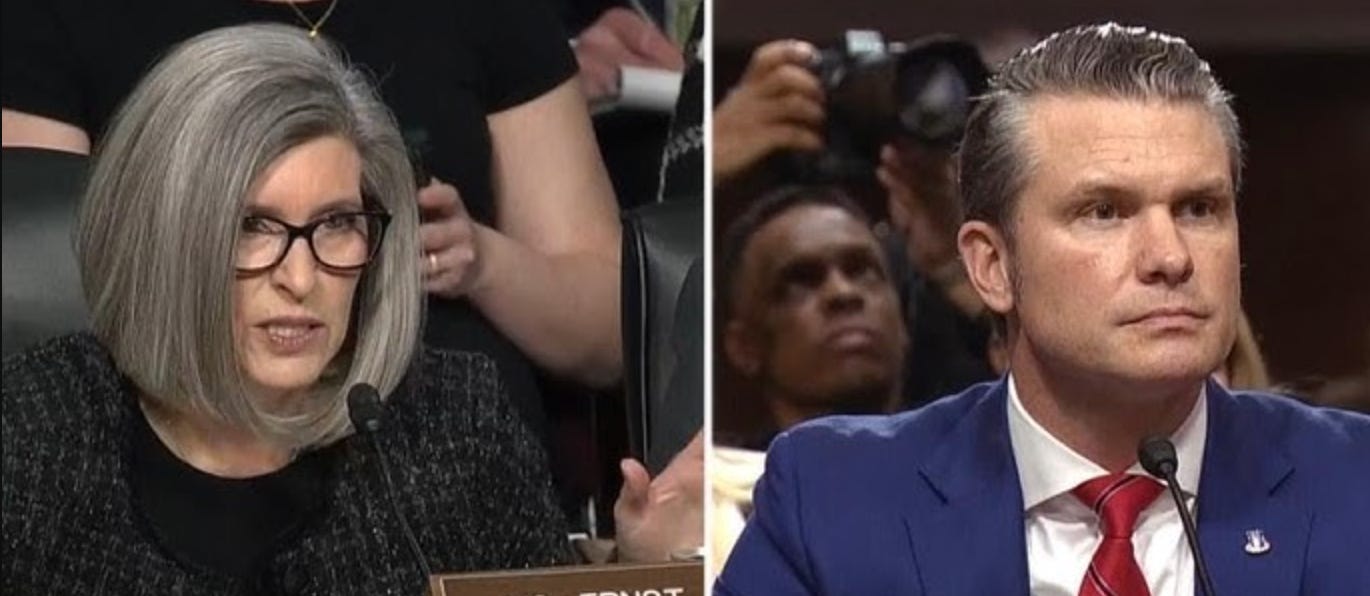Merit.
How an unqualified Defense Secretary, weaponized tragedies, and million-dollar media settlements reveal the cost of choosing loyalty over truth.
In the wake of the Potomac air disaster that claimed 67 lives, Donald Trump stood in the White House briefing room to lecture America about merit-based hiring. He falsely claimed, even before an investigation could have been started, that he knows the crash was caused by recruiting a diverse pool of talent to be air traffic controllers. By his side sat Defense Secretary Pete Hegseth, recently confirmed by the narrowest of margins through a tie-breaking vote - only the second time in history a Cabinet nominee required such intervention, following Betsy DeVos's confirmation in Trump's first term.
Let's be crystal clear about Hegseth's "merit": This is a man who was forced out of multiple veterans' organizations amid allegations of financial mismanagement and sexual misconduct. A man who, according to internal whistleblower reports, would get so drunk at work functions that he had to be carried out - even after his organization instituted a "no alcohol" policy specifically because of his behavior. A man who took his staff to strip clubs on work trips and, according to staffers, had to be stopped by security from climbing on stage. A man who faces credible allegations of sexual assault, with one woman receiving a settlement that included a non-disclosure agreement. A man whose own mother wrote that he "belittles, lies, cheats, sleeps around and uses women for his own power and ego."
This is Trump's idea of merit-based hiring - a man who, according to Department of Defense officials themselves, lacks any relevant experience for what they call the second hardest job in the executive branch. Only 20% of Americans approve of Hegseth's appointment. His confirmation came not through demonstrating competence, but through the raw exercise of political force, as Trump's allies made it clear there would be a very steep cost for any Republican senator who dared oppose him. The traditional role of Senate advice and consent - meant to serve as a check on unqualified nominees - crumbled in the face of what one senator privately called "a feral intimidation campaign."

Yet there was Hegseth on Thursday, nodding along as Trump blamed the Potomac crash on diversity initiatives, claiming we need "the highest level of genius" in federal positions. The breathtaking hypocrisy would be almost comical if it weren't so dangerous.
The war on merit isn’t limited to just the administration’s hiring practices, however. Trump and his allies, including Vice President Vance, regularly amplify merit-less claims from anonymous internet posts while attacking legitimate news sources.
Let’s look back a few elections ago, when standards were a little bit higher. Remember when Vice Presidential candidate Sarah Palin's inability to name her news sources in a Katie Couric interview became a watershed moment in the 2008 campaign? Now such basic standards of information literacy have been completely abandoned by Republican leadership. Re-tweets of unfounded, completely incorrect statements by internet trolls will regularly appear in the feeds of those who follow the president online.

This deliberate assault on truth has real consequences. While mainstream media outlets can fact-check and debunk false claims, the Republican base increasingly exists in an information ecosystem where such corrections never penetrate. Truth matters less than what gets amplified on Truth Social, creating a parallel reality where facts become malleable tools for political manipulation.
The human cost of this information warfare is devastating. Consider Trump's response to Hurricane Helene in Georgia. Even as communities struggled to recover, Trump arrived in Valdosta spreading demonstrably false claims that President Biden was "sleeping" and refusing to respond to Governor Brian Kemp's calls for assistance. He maintained this fiction even after being told that Kemp had confirmed speaking with Biden, who had offered direct support. The truth - documented and verified - was that Biden had spoken with Kemp, North Carolina Governor Roy Cooper, and local officials the previous night. But in Trump's parallel reality, facts yield to political opportunity.
This pattern of exploiting tragedy for political gain reaches even darker depths. In Springfield, Ohio, Nathan and Danielle Clark lost their 11-year-old son Aiden in a tragic school bus accident last year. Instead of being allowed to grieve in peace, they found themselves caught in Trump's web of misinformation. During a presidential debate, Trump made wild, unfounded claims about their community: "In Springfield, they are eating the dogs, they are eating the cats, they are eating the pets of the people who live there." Even when ABC moderator David Muir cited the Springfield town manager's direct refutation, Trump doubled down, insisting "I've seen people on television say, 'My dog was taken and used for food.'"
The amplification of these false claims by then-Senator/VP Candidate J.D. Vance - who cynically acknowledged "It's possible, of course, that all of these rumors will turn out to be false" while still urging his "fellow patriots" to "keep the cat memes flowing" - demonstrates how the entire Republican power structure now operates in service of these manufactured crises. As neo-Nazi groups began marching through Springfield chanting hateful slogans, as death threats forced the Clarks under police protection, as their son's memory was twisted into racist propaganda, the family wasn't just mourning anymore - they were being actively terrorized by the forces Trump's rhetoric had unleashed.
"They have no right to speak for him like this," Danielle Clark said after finding flyers with her dead son's photo being used to promote hate. "It's making me sick." Their story reveals the true cost of Trump's tactics - not just in abstract political terms, but in the tangible suffering of real American families who find their deepest pain transformed into ammunition for somebody else's power grab.

The pattern extends beyond individual incidents. When a terrorist attack occurred in New Orleans last month, Trump immediately blamed illegal immigration, even though the perpetrator was a U.S. citizen born in Texas. When California battled wildfires, he pointed fingers at Governor Newsom's water management policies, offering no evidence that different policies would have affected firefighting efforts. And then he suggested he would withhold federal aid from California as leverage for his political goals.

Meanwhile, news has emerged that Paramount is in settlement talks with Trump over his $10 billion lawsuit regarding a 60 Minutes interview he claims was deceitful and harmful to him, neither of which are true - a suit legal experts consider merit-less but that gains leverage through the Trump administration's control over regulatory approvals the company needs. This follows similar settlements with ABC News ($15 million) and Meta ($25 million), suggesting a pattern of using litigation to silence and intimidate media organizations that dare to challenge his narratives. These settlements create a chilling effect, making news organizations increasingly hesitant to publish damaging truths about Trump, even when backed by solid evidence.

The real tragedy here isn't just the loss of life in the Potomac crash - devastating as that is - but the loss of our collective ability to face challenges as a united nation. When every disaster becomes fodder for political division, when merit is sacrificed for loyalty, when grief is exploited for power, we lose the capacity to learn from our mistakes, to implement genuine solutions, and to heal as a community.
As the National Transportation Safety Board begins its investigation into the Potomac disaster, we already know one thing: The truth will emerge not from presidential "common sense" or the pronouncements of unqualified appointees, but from careful investigation, analysis of evidence, and adherence to facts. The question is whether enough Americans still care about that difference.
The families of the 67 victims deserve better than to have their loved ones' deaths twisted into talking points for a manufactured culture war. They deserve what the Clark family was denied: the dignity to grieve in peace, leaders who prioritize competence over loyalty, and a country that unites rather than divides in times of tragedy.

But as long as we allow national tragedies to be weaponized for political gain - as long as we accept the elevation of sycophants over qualified professionals - we'll continue to be less safe, less united, and less able to address the real challenges facing our nation. That's not common sense – it's common corruption.








